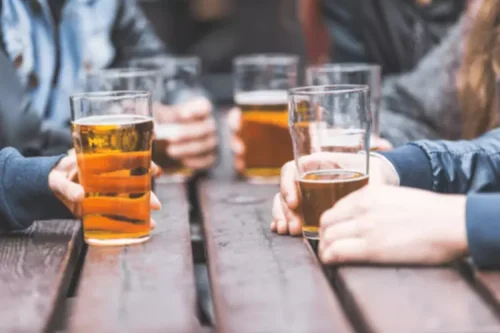
The amount of alcohol a person drinks is the biggest predictor of BAC. A 2016 study found that very intoxicated people underestimate how drunk they are, how extreme their drinking is, and how likely their drinking is to affect their health. Blood alcohol content (BAC) is the unit used to measure the amount of alcohol in a person’s bloodstream. The Reframe app equips you with the knowledge and skills you need to not only survive drinking less, but to thrive while you navigate the journey. Our daily research-backed readings teach you the neuroscience of alcohol, and our in-app Toolkit provides the resources and activities you need to navigate each challenge. Moreover, the problem isn’t just the inebriated person’s inaccurately perceiving risk, it’s also their taking risks that are unwarranted, foolish, or precarious.
Alcohol Seller-Server Training (Off-Premise)
Anyone who drinks heavily should know the health risks ahead of time— as well as how to get help for an alcohol problem. Being drunk can feel euphoric and social at first but what does being drunk feel like can lead to confusion, loss of coordination, and emotional instability as intoxication increases. Unquestionably, then, alcohol can change how you think, feel, and behave.
Sobriety or low-level intoxication
How much alcohol you consume plays a role in how long you’ll stay drunk. Here’s a look at all the variables that affect how long drunkenness lasts. You’ve knocked back a few drinks https://ecosoberhouse.com/ and things start looking a little fuzzy. American Addiction Centers (AAC) is committed to delivering original, truthful, accurate, unbiased, and medically current information.

The Affectionate Drunk
This article examines the effects of alcohol, their duration, and whether individuals can hasten the sobering process. If you’re concerned about how you behave when you drink and want to reduce how much you consume, Ria Health may be able to help. Our online program offers medication for alcohol cravings, coaching, virtual support groups, and handy digital tools—all from an app on your smartphone. You don’t even have to quit drinking completely or identify as an alcoholic to join. Do you know someone who always seems to black out after drinking? People who consume a lot of alcohol in a short period of time (AKA binge drinking) can sometimes experience memory loss, remembering little to nothing of the night before.

When a person consumes alcohol, the full effects may take some time to become apparent. People between the ages of 20 and 29 were the most likely to indicate feeling overwhelmed when drinking. Elements like peer influence, genetics, and even education status can become factors in how a younger person’s body functions after alcohol consumption. Research has found that young adults in college (and living on campus) are generally more likely to engage in heavy drinking behaviors, including binge drinking. Understanding what it feels like to be drunk involves exploring a mix of physical, emotional, and psychological sensations.

Staying Healthy

When alcohol suppresses ADH, it causes your kidneys to release more water, which is why you pee more when you drink. Your brain produces antidiuretic hormone (ADH), which tells your kidneys how much water to retain. Alcohol limits ADH production, which brings us to our next body part. Read on to learn exactly why and how you go from drink to drunk. Alcohol starts entering your bloodstream through small blood vessels in your mouth and tongue before traveling through your digestive system.
- For more on how alcohol impacts emotions, you can read How Does Alcohol Impact Your Emotions?.
- This lack of coordination can increase the risk of accidents and injuries.
- Initially, many people report feeling euphoric, happy, and more social.
- It is important to note that even after the initial feeling of drunkenness wears off, alcohol can still impair cognitive and motor functions.
- The stages of intoxication vary from person to person based on a variety of factors.
- The following are some questions people often ask about drinking alcohol.
- It should not be used in place of the advice of your physician or other qualified healthcare providers.
- The cerebellum is one of the most sensitive areas of the brain to the effects of alcohol because it has the ability to control functions like memory and emotions.
- The night that was meant to be filled with cliffhanging plot twists turns into blurry mumblings as you stumble off to bed.
Receive encouragement from people worldwide who know exactly what you’re going through! You’ll also have the opportunity to connect with our licensed Reframe coaches for more personalized guidance. It continues its rampage throughout the body, disturbing the sleep cycle, causing dehydration, and wreaking havoc in the stomach. The next day, we’re left with a pounding headache, Sahara Desert-level thirst, and a stomach performing its own version of the Riverdance. After eating half of your body weight, you slip into food coma.
- You will not be able to breathe normally, and your gag reflex won’t work correctly.
- The call is free and confidential, and you don’t have to commit to a program to learn more about alcohol rehab.
- Alcohol consumption can impact a person’s ability to process short and long-term memories, and manage and process emotions, which may create a sense of feeling overwhelmed.
- Adrienne Santos-Longhurst is a Canada-based freelance writer and author who has written extensively on all things health and lifestyle for more than a decade.
- ABV is the percentage of pure alcohol within a drink’s total liquid volume.
- As intoxication progresses, individuals may experience nausea and dizziness.
- This is because alcohol stimulates the release of dopamine and serotonin, which are sometimes referred to as your “feel good” hormones.
- The gag reflex may stop working properly, and it may be possible to choke on vomit.
- Various factors can also influence how long a person may feel drunk for.
This is why you smell like a brewery after a night of drinking. It’s also the alcohol content that breathalyzer tests pick up. Having food in your stomach slows absorption, while drinking on an empty stomach has the opposite effect.
Gratitude enhances health, brings happiness — and may even lengthen lives
Just because you can “hold your drink” and don’t feel intoxicated doesn’t mean that you’re not. Drinking regularly overtime can lead to developing a tolerance to alcohol. This means that your body adapts to having alcohol, so you need more to feel the same effects that you did before. Whether or not you’ve eaten affects how quickly alcohol enters your bloodstream. Males and females metabolize alcohol differently because of differences in body composition. Females tend to have higher body fat percentages, and fat retains alcohol, leading to higher BAC and staying drunk longer.
You are sober or mildly intoxicated if you consumed one or fewer alcoholic drinks over the course of an hour. There’s nothing wrong with being affectionate with people we are familiar with. However, alcohol can also lower our guard in the company of strangers, making us more likely to engage in risky sexual behavior. Studies show a link between increased alcohol consumption and unsafe sex—not to mention that drunk sex is not consensual sex.
